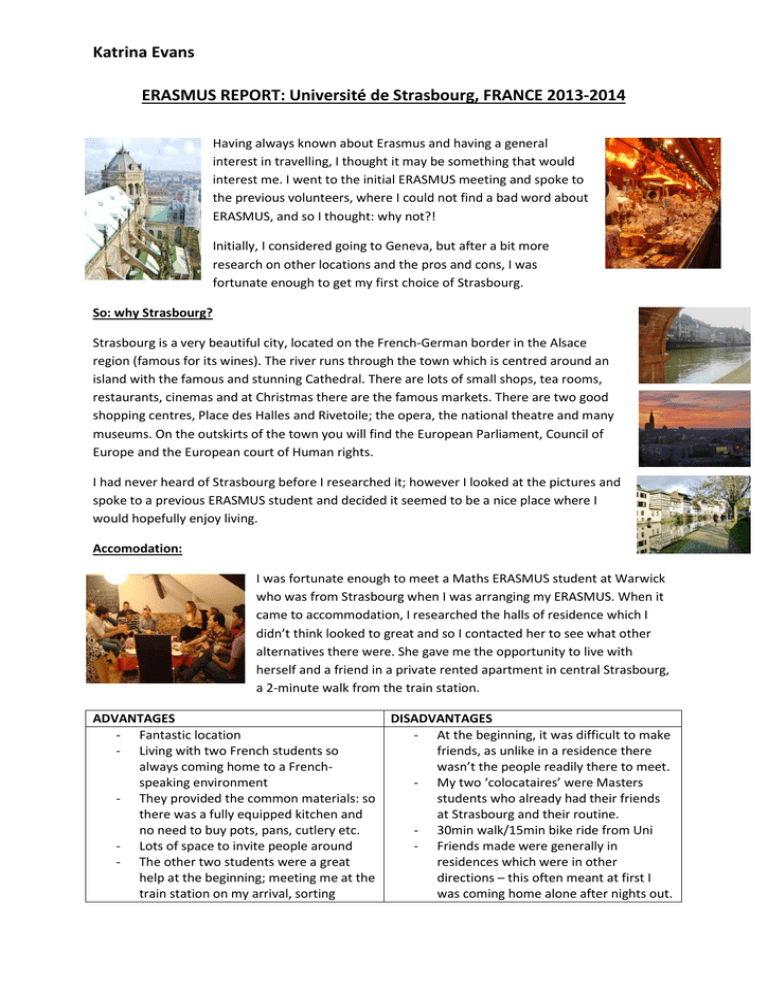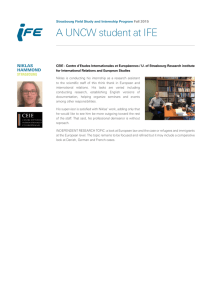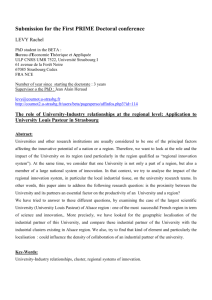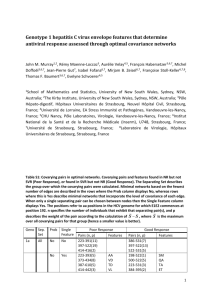Katrina Evans ERASMUS REPORT: Université de Strasbourg, FRANCE 2013-2014
advertisement

Katrina Evans ERASMUS REPORT: Université de Strasbourg, FRANCE 2013-2014 Having always known about Erasmus and having a general interest in travelling, I thought it may be something that would interest me. I went to the initial ERASMUS meeting and spoke to the previous volunteers, where I could not find a bad word about ERASMUS, and so I thought: why not?! Initially, I considered going to Geneva, but after a bit more research on other locations and the pros and cons, I was fortunate enough to get my first choice of Strasbourg. So: why Strasbourg? Strasbourg is a very beautiful city, located on the French-German border in the Alsace region (famous for its wines). The river runs through the town which is centred around an island with the famous and stunning Cathedral. There are lots of small shops, tea rooms, restaurants, cinemas and at Christmas there are the famous markets. There are two good shopping centres, Place des Halles and Rivetoile; the opera, the national theatre and many museums. On the outskirts of the town you will find the European Parliament, Council of Europe and the European court of Human rights. I had never heard of Strasbourg before I researched it; however I looked at the pictures and spoke to a previous ERASMUS student and decided it seemed to be a nice place where I would hopefully enjoy living. Accomodation: I was fortunate enough to meet a Maths ERASMUS student at Warwick who was from Strasbourg when I was arranging my ERASMUS. When it came to accommodation, I researched the halls of residence which I didn’t think looked to great and so I contacted her to see what other alternatives there were. She gave me the opportunity to live with herself and a friend in a private rented apartment in central Strasbourg, a 2-minute walk from the train station. ADVANTAGES - Fantastic location - Living with two French students so always coming home to a Frenchspeaking environment - They provided the common materials: so there was a fully equipped kitchen and no need to buy pots, pans, cutlery etc. - Lots of space to invite people around - The other two students were a great help at the beginning; meeting me at the train station on my arrival, sorting DISADVANTAGES - At the beginning, it was difficult to make friends, as unlike in a residence there wasn’t the people readily there to meet. - My two ‘colocataires’ were Masters students who already had their friends at Strasbourg and their routine. - 30min walk/15min bike ride from Uni - Friends made were generally in residences which were in other directions – this often meant at first I was coming home alone after nights out. Katrina Evans arrangements such as a bank account, and showing me around the city. - Unfurnished - had to buy a bed and desk. The majority of my friends lived in residences: most of the students in halls are exchange or international students – great for making friends but not great if you want to improve your French! Cost implications - I paid €255 per month plus electricity and internet costs, but then I got about €90 CAF every month (CAF is a government payment to help with accommodation costs which all students in France get). Be persistent with CAF, I nearly gave up with them, their paperwork is endless and I had so many problems, but as you can see at the end it was well worth it. They also backdated the payments once I had confirmation I would receive CAF and hence I got the money for the whole period of being a student there. Arrival: Welcome: The international office had organised a welcome day for us which I found really helpful. As I didn’t live in a residence, this was my first opportunity to meet other exchange students and the day involved a welcome talk, a tour of campus, an opportunity to eat lunch at the university restaurant, an afternoon of outdoor games and a boat tour of Strasbourg. Bank account: my colocataire helped me with this when I arrived. We went to a few banks and she spoke to them, particularly looking at costs of opening an account and international transfer fees. I ended up opening an account with BNP Paribas as it was a free account for two years with no transfer costs to international accounts. I had many problems with the arrival of a card and details and information, but this was finally sorted after 6 weeks. Following this I had very few problems. Phone: I was looking for a cheap French SIM card and I found Prixtel where I paid a base amount of €2 per month for unlimited texts and some calls; I often had extra costs for texting international numbers and extra calls. I ordered it online and it arrived quickly. Public transport and regional transport: I hired a Vélhop bike for the year, which despite their touristy look, was by far the best decision I made! I paid €40 for the year with €150 deposit. I had no problems and the freedom to go where I wanted, whenever I wanted without the hassle of having to sell a bike at the end of the year. Alternatively, the trams are fantastic in Strasbourg; to complement the use of the bike I bought sets of ten single passes which cost me €14.40. There are direct trains that go elsewhere in France as well as Germany, Switzerland, Luxembourg and Belgium. For the Alsace region at the weekends you can get day passes for groups of up to 5 for about €35. We used these frequently and I would highly recommend them. There are also eurolines Katrina Evans buses which go to various locations throughout Europe, and Meinferne buses for Germany. We often also went to the train station at Kehl where you can get BadenWuttemburg region day passes for groups of up to 5, again very worth it. Strasbourg airport, Baden-Baden airport (Germany) and Bale/Basel airport (Switzerland) are all close by with cheap airlines.. Food and drink: Tarte Flambée is the local meal which you most definitely won’t miss at Strasbourg; Flam’s is fantastic for a huge choice of tarte flambée’s, all you can eat options, and plenty of room for big groups – be warned it is pretty much the only place to eat in Strasbourg with a big group! There are lots of lovely cafés, restaurants and tearooms in Strasbourg; the majority are quite small but very homely and cosy. Barco Latino, a permanently moored boat, is a great night out and Le Korrigan is good too. There are lots of bars: I particularly liked Le Gayot, Cafe Atlantico and L’alchimiste. The majority have a great ambiance but are small. University modules and FLE: I had already looked at modules before arriving to allow me to complete my learning agreement beforehand, as requested. However, upon arrival I discovered that not all of the modules were running, different modules were running that I hadn’t been aware of and there were clashes. This meant I had to have a re-think. I wanted a mix of modules: some that were like previous Warwick modules to allow me to gain a better understanding as well as some new things. Term 1: Equations différentielles (Yr 2, sem. 2), Probabilités et Statistiques (Yr 2, sem. 1), Algèbre (Yr 3, sem. 1), Calcul différentiel et integral (Yr 3, sem. 1), Culture Mathématique (Yr 2, sem. 2), FLE Term 2: Equations différentielles (Yr 3, sem. 2), Algèbre (Yr 3, sem. 2), Topologie (Yr 3, sem. 2), FLE In France the university teaching system is very different: for each main module (6 ECTS, equivalent to 12 CATS) there is a 2-hour lecture every week and a 3-hour ‘TD’ (support class). My first impressions of this were fantastic: the lecturer taught both and the support class had a big teacherclass interaction. However as time went on I realised this was a particularly good lecturer and the others didn’t follow suit: sometimes it was an assistant doing the class, the classes were boring and tiring, there was little support with the questions and a lot of work to take away. I found it very difficult to mix with the other students in my classes: classes were small, everyone had their own friends and as a result of this they weren’t interested in trying to talk to someone who couldn’t speak the language well. They were very closed and I didn’t find them particularly friendly or helpful. The only problems I had following the lectures were reading handwriting and understanding abbreviations. Once I was used to this I didn’t find it a big difficulty, a lot of terms in Maths are universal and following calculations and notation you are able to quickly relate it to the English equivalent. Katrina Evans Key abbreviations: Abbreviation t.q. c.à.d ker(...) French tel que c’est-à-dire noyau English Such that It means that kernel FLE was a French language course for foreign students. I would highly recommend it: it’s an independent module which facilitates learning through using the centre’s resources and regular group discussions. It was good for meeting other international and ERASMUS students, for sharing problems, getting help with lecture work and language issues. There was a library to borrow all kinds of books of all levels and you could sign up to extra classes each week, specialising in the specific areas you want to improve. It greatly helped my improvement of French and I really enjoyed working there. Language: I was extremely stubborn when I moved out to France: I told myself my main aim for the year was to learn French and I was not to get myself stuck in a rut of speaking English all the time due to ease. No lies to be told: this was difficult at the beginning! I only had GCSE French and a Warwick language centre module of level 3 and I had previously spent two summers Au Pairing for a French family. My low level of French meant I was shy to speak to people and begin conversations, yet I refused to make friendships with other English exchange students! However, in the end I made some fantastic friends, in particular a lot of people from North Africa who are bilingual in French: they helped me massively in improving my French and are persistent in keeping in contact now so that I can continue speaking the language; I have a lot to thank them for! Naturally you meet English people and become friends with them and at the end of the year I could see some of them who had spoken English in their residences and made English friends, resulting in little language improvement. If you want to improve your French, you must be stubborn! For nearly all foreign students it is easier for them to speak in English and it is easy for us to let go; be persistent! Get involved: ESN and SUAPS (Sport): University life in France is very different in comparison to university in England. It seems to be an extension of school where students still live with their families or go to the closest university to home. This means that there are not many societies or events in which you are able to meet the local students. However, ESN Strasbourg is a fantastic association for the international University Katrina Evans community – very much like the World@Warwick society. Throughout my year there, the group of French students who ran the society organised many events which I took part in. Social evenings such as Language cafes, international dinners and quiz nights; day trips to local cities: Nancy, Metz, Freiburg, the Christmas markets and the Route des Vins; weekends away to: Lyon, Brussels, Bruges, Lille and hiking in the local mountains. As well as this there was the opportunity to participate in SocialErasmus, allowing international students to get closer to the local community. I went into two secondary schools to do presentations on Erasmus and different cultures with the students and I also spent a few days working on a local wine farm; my efforts with SocialErasmus resulted in an award from the ESN section. SUAPS is the sports centre at the University. I paid €25 for the year which allowed me do up to 5 sports classes a week ranging from fitness and dance classes to basketball and climbing. There are also lots of opportunities to go on outings for a small additional cost. I managed to go on several horse riding day trips and an overnight trip as well along with several skiing trips. Night-time skiing in the local mountains (The Vosges) and full days skiing locally and in Switzerland. In summary: Do not miss this opportunity. I know it’s a cliché, but my ERASMUS year has really been the best year of my life. Words cannot begin to explain the many things I have learnt, but I can say that I have met many fantastic people, learnt about and explored many different cultures and religions and most of all I am now able to fluently have a conversation in French on Skype with my friends. After a very difficult first two years at Warwick, ERASMUS was the break I needed before my final year and it has allowed me to realise that there is so much of the world I must explore once I have graduated. Things not to miss when at Strasbourg: - Chateau de Pourtalès and Foret de la Robertsau Piscine du Wacken Climb to the top of the Cathedral on a sunny day Visit the opera and all of the European buildings If any potential future ERASMUS students wish to contact me about my experience, they are welcome to at: katrina_louise27@hotmail.co.uk Soirée Marocaine Aquathlon de Strasbourg Soirée Algérienne


